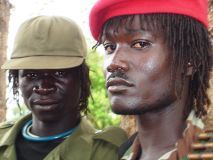Life returns to normal in north Uganda thanks to South Sudan – LRA
By James Gatdet Dak Lampuar
September 20, 2007 (JUBA) — The official Spokesperson of the Ugandan rebel Movement, the Lord’s Resistance Army (LRA) this week said life was returning to normal in northern Uganda after twenty-one years of brutal conflict in the region.
 Speaking to journalists in Juba, Southern Sudan, on Tuesday, Godfrey Ayoo, said the Government of Southern Sudan’s mediated peace talks in Juba has brought about peace to northern Uganda.
Speaking to journalists in Juba, Southern Sudan, on Tuesday, Godfrey Ayoo, said the Government of Southern Sudan’s mediated peace talks in Juba has brought about peace to northern Uganda.
He said his LRA movement and the Ugandan government’s delegations had now been conducting extensive separate consultations among the people of Uganda in order to come up with mechanisms on implementation of a number of protocols signed during the peace negotiations.
The next round of peace talks in Juba between the two parties is scheduled to resume in October, 2007.
The two warring parties in Uganda, now almost peace partners, have in the last one year committed themselves to a Cessation of Hostilities agreement they signed in Juba in August 2006. Other protocols they have so far signed include the power sharing and wealth sharing agreements entitled in the protocol as ‘Resolutions to the Root Causes of the Conflict’, and another protocol on ‘Accountability and Reconciliation.’
The Accountability and Reconciliation protocol addresses the types of justice systems that should be used to bring to book those accused of atrocities and crimes against humanity as an alternative to the International Criminal Court (ICC) justice system.
If the two parties successfully come up next month with a modality on mechanisms to implement the agreements they have already signed, then they will be left to tackle only the two remaining protocols on Formal Ceasefire and DDR (Demobilization, Disarmament and Re-integration) of the LRA combatants.
This continued road to peace in northern Uganda has never been so easy. After he was appointed as Chief Mediator by his President, General Salva Kiir Mayardit, the Vice President of the Government of Southern Sudan, Riek Machar Teny, had to shuttle between Juba and the Congolese border searching for the LRA leader, Joseph Kony, in the thick forests of that jungle amidst security concerns for the life of this VIP.
The Government of Southern Sudan’s leadership initially faced the LRA rebels with some sort of carrot-and-stick policy when approaching the rebels for the first time. Dr. Machar carried with him a strong message with three options from President Kiir to the LRA leadership. The message asked the LRA leaders to choose a peace mediation offer by the Government of Southern Sudan between the rebels and the Ugandan government.
The other two options were that if the offer was rejected, then the Government of Southern Sudan leadership would be left with no other options but to ask the rebels to voluntarily evacuate from Southern Sudan soil and wage their war outside its territory or else face the military might of the SPLA.
After a number of failed attempts, Machar finally met Joseph Kony face to face in the jungle at the Sudan-Congo border in early 2006. The rebels accepted the peace mediation offer.
The peace talks, which kicked off on July 15, 2006, was initially characterized by walk-outs on the LRA side until they gradually gained trust and built confidence with their peace counter-part on one hand and mediation team on the other. At times the rebels accused the Chief Mediator, Dr. Riek Machar, in particular of allegedly favoring the Ugandan government during the talks.
Machar declared several times his government’s invested interest in its efforts to bring peace to northern Uganda. Besides doing similar good job to the people and the government of Uganda for helping the people of Southern Sudan to achieve the Comprehensive Peace Agreement (CPA) in the country, Machar used to publicly state that return of peace to northern Uganda would also consolidate the achieved peace in Southern Sudan. Machar’s further statements pointed out to the resulting normalization of trade between Uganda and Southern Sudan in ending the LRA‘s war. Respective roads linking both Kenya and Congo to Southern Sudan would also open up for trade and boost the development in Southern Sudan, Machar explained.
Before the two warring parties were brought to the peace negotiations in Juba, the LRA rebels were able to cause very serious security threats and disrupt the movement of people and goods between the three states of Greater Equatoria and with their respective neighboring countries.
The rebels activities also prevented the Southern Sudanese refugees in Uganda, Kenya and Democratic Republic of Congo from returning to their places of origin in the three states.
To an un-imaginable scale, this 21-year old brutal war has displaced nearly two million people and forced them to live in dire conditions in over two hundred scattered camps in the region. With this relative peace now prevailing in northern Uganda, the United Nations agencies, international and indigenous humanitarian organizations operating in northern Uganda, have this month begun to close down a number of IDPs camps. The IDPs in those camps reportedly feel secure enough to go back to their places of origin on voluntary basis and decided not to wait until the Juba peace negotiations have been comprehensively concluded.
(ST)
